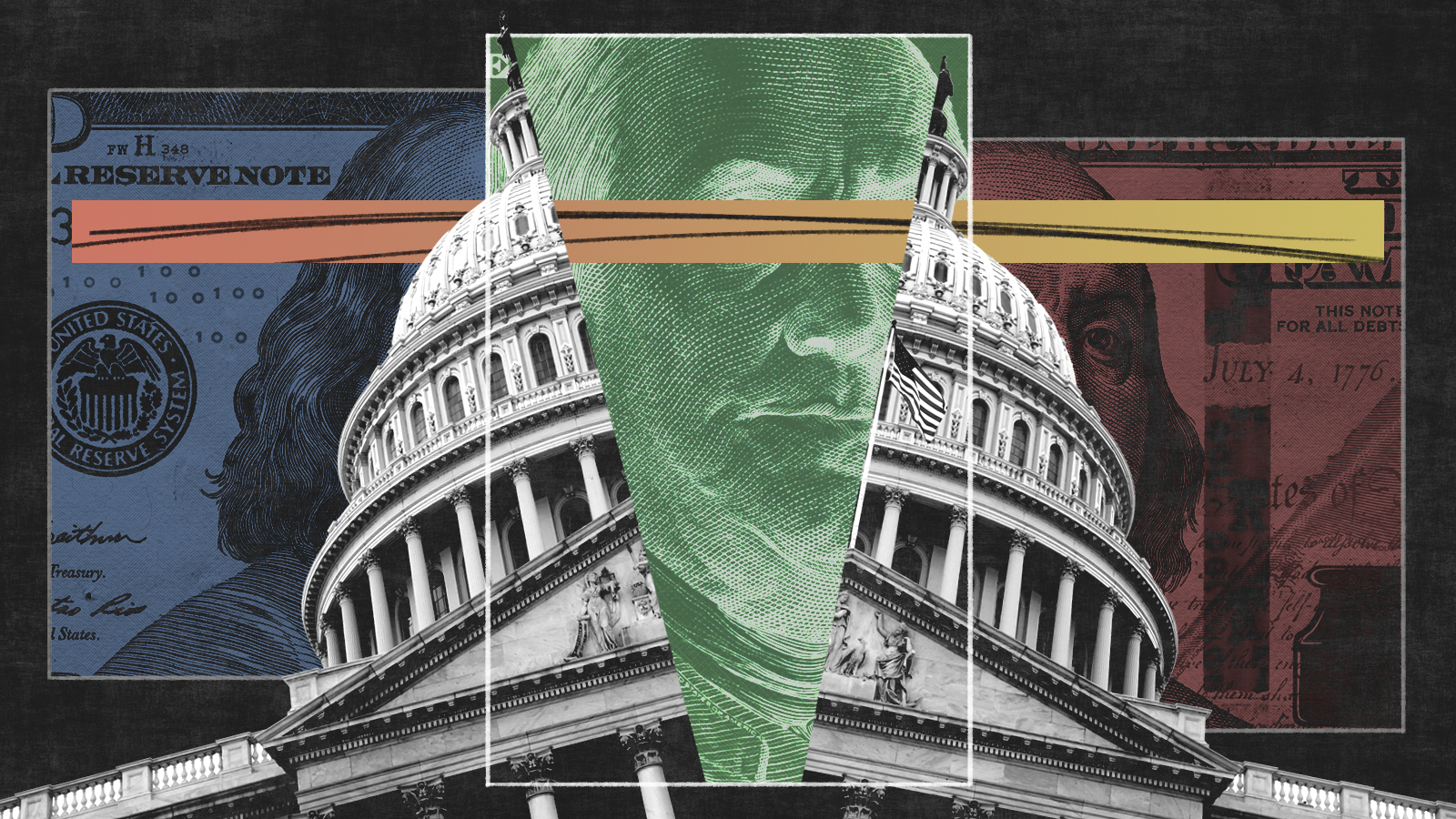A soon-to-be divided Congress braces for the looming budget battle


A free daily email with the biggest news stories of the day – and the best features from TheWeek.com
You are now subscribed
Your newsletter sign-up was successful
With the Thanksgiving holiday and midterm elections (mostly) over, lawmakers in Washington are scrambling to put together a massive, year-end spending package by mid-December — or risk a government shutdown ahead of the new congressional term.
With the stakes high and time short, the pressure is on for this lame-duck session to move quickly in order to avert governmental disaster. But with Republicans poised to assume narrow control of the House come January, and internal schisms within the GOP threatening to derail any nascent legislative agenda, how, when, and what will actually be funded remains an open question for the time being. Here's what you need to know:
What's at risk?
The Federal Government is funded until Dec. 16, thanks to a short-term spending bill signed by President Biden this past September. That measure ensured the government could continue to operate at its current spending levels, but only until Congress passes additional spending bills — which it will have to do by the mid-December deadline, or the government will be forced to shut down.
The Week
Escape your echo chamber. Get the facts behind the news, plus analysis from multiple perspectives.

Sign up for The Week's Free Newsletters
From our morning news briefing to a weekly Good News Newsletter, get the best of The Week delivered directly to your inbox.
From our morning news briefing to a weekly Good News Newsletter, get the best of The Week delivered directly to your inbox.
If there is a government shutdown, tens of thousands of federal employees deemed "nonessential" will likely be furloughed, with various federal sites like national parks, museums, and monuments closed down as well. In 2018, the government shut down for a record-setting 35 days, as congressional Democrats blocked then-President Donald Trump's efforts to fund his planned border wall between the United States and Mexico. This time around, lawmakers are split over including Democratic spending priorities, such as COVID-related funds and increased military aid to Ukraine, for the coming year.
What could happen?
As things stand, there are three possible outcomes:
- Democrats and Republicans work together in the lame-duck session to pass a comprehensive 2023 spending bill before the Dec. 16 deadline expires.
Speaking with The Washington Post this month, Sen. Chris Van Hollen (D-Md.) put the odds at "better than 50-50 for getting an omnibus done by the middle of December." Rep. Kay Granger (R-Texas) was similarly, if cautiously, optimistic, telling Politico that negotiations "are starting to get together," and that she believed Congress would meet its mid-December deadline. While it's possible that lawmakers will indeed pull it off, Hollen nevertheless cautioned that "I'm sure there are some House Republicans who want to play games and kick that process into early next year." Which would mean…
- Congress passes another stop-gap funding measure, known as a "continuing resolution," to keep the government operating at its current funding levels.
This would avert a full shutdown, but throws Washington into an uncomfortable limbo status. Federal programs would see their funding levels stagnating, and future funding uncertain. While avoiding the chaos of a holiday-season shutdown entirely, a CR would only kick the spending can a little bit down the road — potentially for the next session of Congress to take up in full.
A free daily email with the biggest news stories of the day – and the best features from TheWeek.com
This poses a dilemma for House Republicans in particular: is it worth working on a CR now, and waiting until they take their extremely narrow majority in January to try for a full omnibus bill? While conventional wisdom might suggest they'd have better odds of having their funding priorities addressed once they take the House, intense intra-party feuding could make a GOP majority even more prone to stagnation once in power.
"As fractured as we are on a lot of other issues, there's probably no better indicator of the fractures in our caucus than those on federal spending," Rep. Steve Womack (R-Ark.) told Politico, while Rep. Don Beyer (D-Va.) was even more blunt in his assessment of a GOP House majority. "I don't lie awake at night worrying about the bad legislation they are going to pass," he told Politico. "Because I don't think they're going to pass it."
If Congress can't pass a CR in time, then...
- The Federal Government shuts down for an unknown period of time.
Put simply, this would be extremely bad. The last federal shutdown cost the government billions in reduced GDP, as well as delayed spending and paychecks. If there were to be a shutdown now, it would come in the midst of — and exacerbate — a deep and prevailing sense of economic anxiety as well as a potential nationwide recession.
What to watch for:
While the rancorous infighting within the House GOP caucus has garnered the more explosive headlines, the ongoing feud between GOP Senate Minority Leader Mitch McConnell (R-Ky.) and Sen. Rick Scott (R-Fla.) could end up being the most consequential dynamic here. Scott, who recently lost his bid to unseat McCarthy as Senate Leader, has reportedly begun whipping support among his colleagues to push McConnell into blocking any spending deal until after Republicans assume the majority in the House. Speaking with The Hill, Scott explained that he was pushing for a delay in order to refocus Republicans on their legislative priorities at a time when they may have more leverage to do so: "We have to have a plan to deal with inflation, we've got to have a plan to deal with the border," Scott said. "My goal is to organize Republicans to have our ideas, what we're going to get done."
However, not all of Scott's colleagues agree that the party will be in a stronger position in the new year, even with their slim House majority. "Based on how it feels around here right [now], it seems more likely it's going to be a CR but that does create some challenges down the road we would have to deal with next year," GOP Senate Whip Jim Thune (R-Neb.) told The Hill.
Sens. Patrick J. Leahy (D-Vt.) and Richard C. Shelby (R-Ala.) will also play key roles in the coming weeks. As top negotiators for their respective parties in the appropriations process, both men are in their final days as senators, with each set to retire at the end of this session. The pair are reportedly angling to include significant earmarks for their respective constituencies before they step back for good.
Ultimately, a sign of how negotiations are going will be if — and how long — Congress passes a Continuing Resolution to avoid a shutdown by Dec. 16. A shorter CR would suggest that the two parties are relatively close on the bulk of the omnibus spending package's major items, and simply need a few more days to negotiate details.
Rafi Schwartz has worked as a politics writer at The Week since 2022, where he covers elections, Congress and the White House. He was previously a contributing writer with Mic focusing largely on politics, a senior writer with Splinter News, a staff writer for Fusion's news lab, and the managing editor of Heeb Magazine, a Jewish life and culture publication. Rafi's work has appeared in Rolling Stone, GOOD and The Forward, among others.
-
 Switzerland could vote to cap its population
Switzerland could vote to cap its populationUnder the Radar Swiss People’s Party proposes referendum on radical anti-immigration measure to limit residents to 10 million
-
 Political cartoons for February 15
Political cartoons for February 15Cartoons Sunday's political cartoons include political ventriloquism, Europe in the middle, and more
-
 The broken water companies failing England and Wales
The broken water companies failing England and WalesExplainer With rising bills, deteriorating river health and a lack of investment, regulators face an uphill battle to stabilise the industry
-
 Grand jury rejects charging 6 Democrats for ‘orders’ video
Grand jury rejects charging 6 Democrats for ‘orders’ videoSpeed Read The jury refused to indict Democratic lawmakers for a video in which they urged military members to resist illegal orders
-
 Democrats push for ICE accountability
Democrats push for ICE accountabilityFeature U.S. citizens shot and violently detained by immigration agents testify at Capitol Hill hearing
-
 House ends brief shutdown, tees up ICE showdown
House ends brief shutdown, tees up ICE showdownSpeed Read Numerous Democrats joined most Republicans in voting yes
-
 Democrats win House race, flip Texas Senate seat
Democrats win House race, flip Texas Senate seatSpeed Read Christian Menefee won the special election for an open House seat in the Houston area
-
 Will Peter Mandelson and Andrew testify to US Congress?
Will Peter Mandelson and Andrew testify to US Congress?Today's Big Question Could political pressure overcome legal obstacles and force either man to give evidence over their relationship with Jeffrey Epstein?
-
 Rep. Ilhan Omar attacked with unknown liquid
Rep. Ilhan Omar attacked with unknown liquidSpeed Read This ‘small agitator isn’t going to intimidate me from doing my work’
-
 Can anyone stop Donald Trump?
Can anyone stop Donald Trump?Today's Big Question US president ‘no longer cares what anybody thinks’ so how to counter his global strongman stance?
-
 House approves ACA credits in rebuke to GOP leaders
House approves ACA credits in rebuke to GOP leadersSpeed Read Seventeen GOP lawmakers joined all Democrats in the vote
